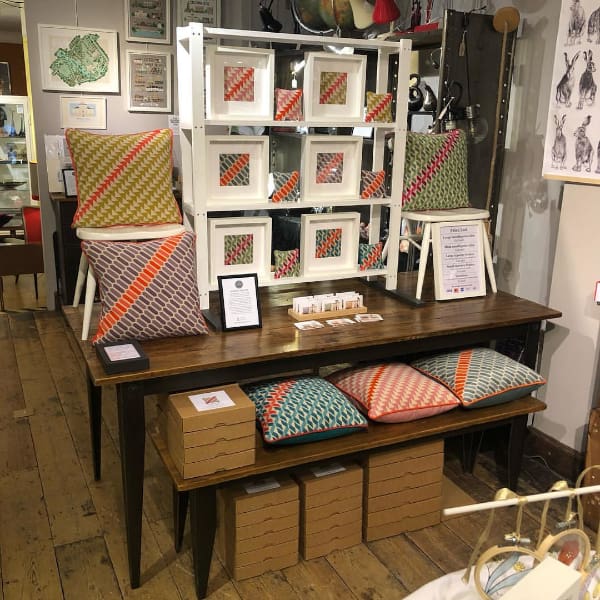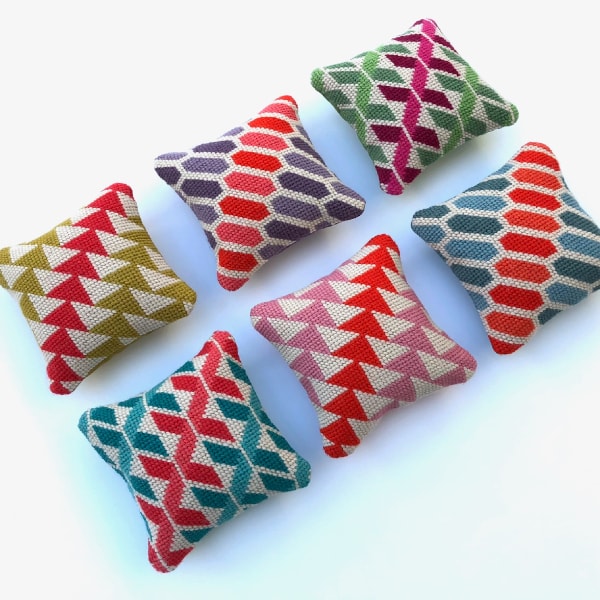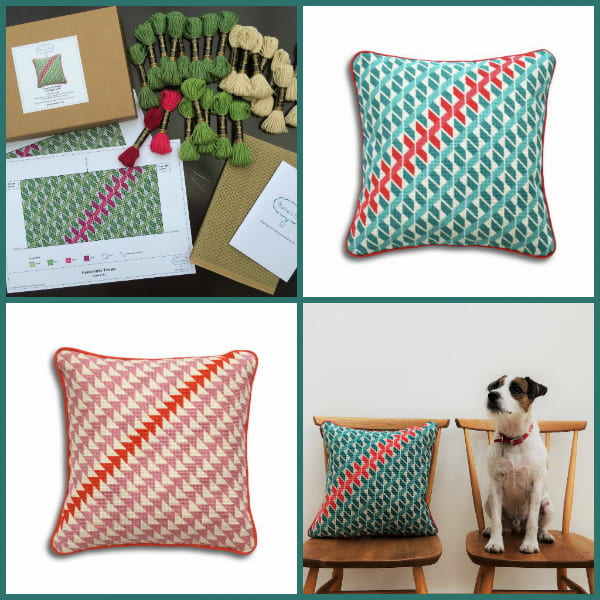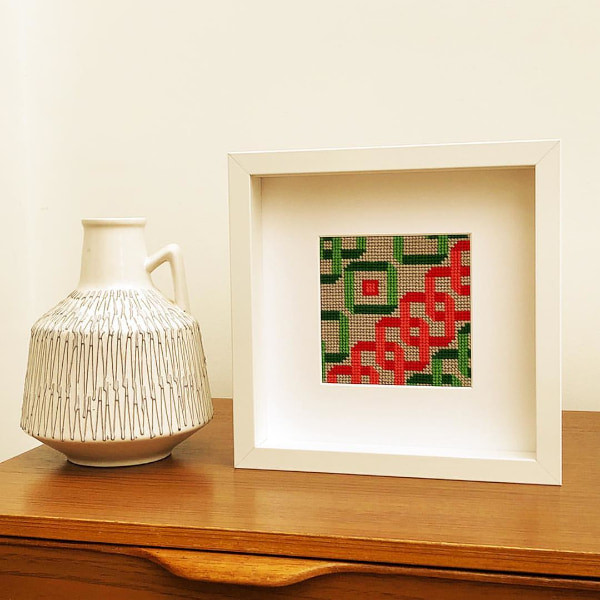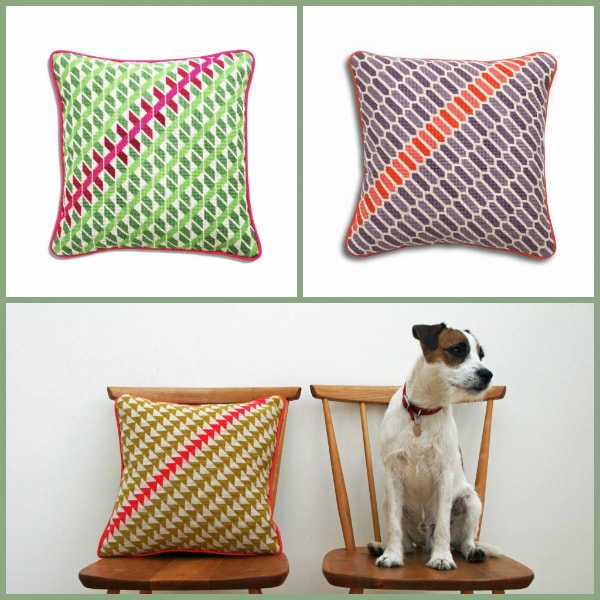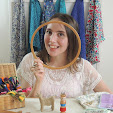Until six years ago Marina was an interior designer but when her love for interiors was challenged by stressful working conditions, she decided to upend her career, swapping paint swatches and floor plans for needle and thread.
It perhaps won’t come as a surprise then that Marina’s needlepoint designs work beautifully finished as cushions or as striking wall art. Rather than taking care of the wider picture, today Marina’s dedicated to the details.
Marina's Home Collection fuses her love of mid-century modern with influences rooted in colour, Scandinavia, ancient paper art, origami, and even Welsh blankets! Exciting colour combinations join the sleek lines of geometric repeat patterns to create well designed needlepoints with an ageless appeal, ideal for a multitude of modern day interiors.
What I love about Marina’s style is how she marries homespun craft techniques and the sumptuous texture of stitched wool with a very cool design aesthetic. Like her mid-century influences, her designs can be appreciated by a wide scope. They’d add warmth to a contemporary bachelor pad, cool factor to a teenager’s bedroom, and chic details to a baby-boomer’s sitting room.
Today we talk to Marina about the importance of community over competition, her experience of selling needlepoint kits at craft fairs, and why she loves what she does. It’s that time again, time to pop your feet up and take ten while we meet Marina of Marina’s Home.
Over to Marina…
When I was a child, I stitched a few little cross-stitch kits, but I’d never done needlepoint. In hindsight, it’s quite strange that I’d never tried it before, as my mum has been avid fan of needlepoint (‘tapestry’, as she calls it) for years.
I only started doing needlepoint about six years ago and that was when I first tried my hand at drawing my own designs. My mum showed me the basics of needlepoint and then I was hooked!
For many years prior to starting up my needlepoint business, I was a commercial interior designer, working mainly on hotel and office projects. However, the stress of it was really affecting me. So, after a couple of false starts, I made the decision to leave the industry entirely and pursue needlepoint as a career.
There are lots of different reasons why I’m so passionate about needlepoint. Firstly, it’s a very calming and methodical craft, which really appeals to me. Secondly, I love the simplicity of needlepoint – the fact that you can create something beautiful with only a few basic supplies and equipment.
Thirdly, the people I’ve met through my business have been absolutely lovely. My customers are just a delight and I’m also enjoying immensely getting to know other designers within the industry.
What are some fun facts about you?
My favourite drink is strong tea (with a splash of milk) and I could drink gallons of the stuff every day.
My guilty pleasure is the Norwegian band A-ha, who were mega-stars in the 1980’s. I’ve loved them since I was 12 years old and I still adore them!
I’m constantly hungry and I tend to graze throughout the day. One of my colleagues used to call me ‘Russell’ because I would always be eating snacks at my desk and he could hear the constant rustling of a packet!
I loved reading your blog post about your first steps selling at craft fairs and markets and wondered how you’ve been getting on with them since?
Yes, I love taking part in fairs! It’s so great to meet my customers and chat with them. It’s also a brilliant way to get feedback and suggestions, as well as introducing people to the wonderful world of needlepoint.
I find fairs that are geared towards needlecrafts are much better for me, rather than general craft fairs. People that come to The Knitting & Stitching Show and to Thread are already very interested in similar crafts to needlepoint, even if needlepoint isn’t one of their current hobbies. Therefore, they are much more willing to give it a try.
One important thing I’ve learnt about fairs is to always bring my tapestry frame and a piece of needlepoint to work on! It really draws people in and breaks the ice.
I think they like the fact that I’m not standing there, waiting to pounce on them and so it creates a more relaxed atmosphere.
Some people are happy to stand and watch me stitch, while others are keen to give it a go. I also have lots of children visiting my stand who are interested in trying needlepoint, which is brilliant, as it’s such a mindful thing to do.
Some people are happy to stand and watch me stitch, while others are keen to give it a go. I also have lots of children visiting my stand who are interested in trying needlepoint, which is brilliant, as it’s such a mindful thing to do.
How would you describe your design style?
I would describe my needlepoint designs as colourful, fresh and geometric. I absolutely love geometric patterns, despite having a completely non-mathematical brain!
I think the visual rhythm that a geometric pattern creates is fascinating.
I also adore experimenting with colour combinations and putting colours together that aren’t always obvious companions.
You’ve mentioned newbies to the craft are hesitant to try, what advice would you give them?
I would tell them just to give it a try! Needlepoint is surprisingly simple to do, especially if you use a basic tent stitch. Personally, I think it’s much easier to master than, say, knitting or crochet. It’s surprising how quickly you’ll start to see your stitches covering the canvas, which is extremely satisfying.
Also, it’s such a therapeutic craft to do. So, for that aspect alone, it’s a really worth trying.
Back in March last year you began a community with other local creative business owners, has the group taken off?
Yes, our group – Chiswick Creatives – has really taken off! When I started the group, I had no agenda at all, apart from the desire to connect with other local designer-makers. We now have a core of really enthusiastic members and I’m happy to say that we’re going from strength to strength.
Last Christmas, we collaborated with a gorgeous vintage store – The Old Cinema – at the heart of our high street. The store is a local institution and we created a huge buzz for the event beforehand. Consequently, it was a great success. We’re just in the process of organising our next Christmas event, which is going to be bigger and even better.
Our unofficial motto is, ‘Together we can do more!’, which is so true.
As a collective, we’re much stronger and we can seek out opportunities and collaborations that would be much more difficult to achieve as individuals.
Aside from the opportunities, it’s just so nice to meet with other like-minded people once a month; to swap advice and ideas, and to talk about the highs and lows of having your own creative business.
Why are you a needlepoint designer?
The simple answer is that I do it because I love it. For the first time ever, I feel that I’ve truly found my niche.
With my kits, I hope to offer people a lovely design to stitch, in dynamic colours. It’s such a thrill whenever somebody tells me that they’ve enjoyed stitching one of my designs, or that they specifically love the colours.
I’m not influenced by particular trends, so I just design something that I love.
When someone else loves it too, it’s just the best feeling.
Aside from the pleasure of stitching the piece, my customers will have an end product that they can be proud to display in their home.
Which threads and tools do you like the most?
At the moment, I use Anchor wools for all my designs. I love their chunkiness when used on 10-count canvas and their range of colours.
I couldn’t live without my Elbesee tapestry frame. It’s a floor-standing one and it just makes stitching so much more comfortable. It means I can work two-handed, which really speeds things up.
What’s your creative space like?
If I’m stitching during the day, I usually sit in our kitchen-diner. It backs onto the garden and the whole back section is glazed, including the roof, so it’s always light and bright. If I’m stitching in the evening, it’ll usually be in the living room, which is much more cosy. I love working with the TV on and with our dog dosing in his basket.
I have a workroom in our attic, but it’s mostly in a chaotic state! I need to do a complete overhaul and get some proper storage, as it’s really cobbled together from random pieces of furniture. It’s something I keep promising myself, but never get round to doing! However, it’s a great space if I need peace and quiet, as I can really concentrate there.
I swing wildly between being extremely organised and working in complete disarray. It really depends on how much sleep I’ve had (I’m a very light sleeper) and what else is going on at the time.
I have my collection of Anchor tapestry wools, which is growing all the time! My favourite part of the process is experimenting with different colour combinations and seeing what gives me that ‘yes!’ feeling.
Does your passion for interior design go hand in hand with your needlepoint designs?
I love both mid-century design and Scandinavian design, so my needlepoint designs really reflect those influences. For me, simple, unfussy design is the best and hopefully this is what I bring to my needlepoint.
Sadly, doing interior design as a job really took the pleasure out of it. By the time I left the industry, I’d completely fallen out of love with it. I still don’t buy interior design magazines and I generally don’t follow interior design accounts on social media. However, I still have a passion for mid-century furniture and ceramics, which I’m really happy about.
We’d love to hear more about your creative process, how do you work with an idea to finished product?
I start off by drawing in my sketchbook. For a new geometric pattern, I’ll start doodling away, looking at shapes and proportion, but keeping it quite loose at that stage. Once I’ve got something I think I can work with, I overlay detail paper onto graph paper and draw a portion of the design by hand, to see if I can make it work properly. When I feel happy with it, I’ll draw the design on computer and begin to really finesse it.
Once I’ve got a design and chosen initial wool colours, I’ll then do quite a lot of test stitching. I find that loose skeins of wool and a design on a chart will often translate very differently when actually stitched, so I often need to do some tweaking of the design and colours at that stage.
At the moment, I use the same canvas and range of wools for all of my designs, so I know that the costings won’t vary too much.
Which indie designers do you love?
There are some very talented designer-makers out there! Just too many to mention. However, some of my favourites are Jane Sedgwick, HOY Pottery, Miesje Chafer, Teddy and Wool, H.Muir Designs, Formworks Studio and Jane Foster.
All of these designers have a very strong design aesthetic, which is unmistakably theirs. They produce simple, clean designs, but executed brilliantly.
What are the best needlepoint resources you’ve found?
My most useful design resource is my trusty Anchor tapestry wool colour card. It’s just something I couldn’t do without!
With regards to needlepoint books, it might sound strange, but in all honesty, I tend not to buy them.
I try not to be too influenced by other needlepoint designers, as I don’t want to inadvertently copy their style or designs.
I do have a handful of books that are really nice, though. Ages ago, my mum gave me her ancient copy of the Reader’s Digest ‘Complete Guide To Needlework’. I do love this volume, as it shows a myriad of different stitches and the early 80’s photographs are just brilliant.
Two other lovely books I have are ‘Adventures In Needlework’ by Jessica Aldred and Emily Peacock, and ‘Korssting’ by Mette Jørgensen. Emily Peacock is obviously an inspirational figure in the needlepoint industry, so that’s a must-have book. Mette Jørgensen is a lovely Danish designer, who produces beautifully elegant cross-stitch patterns.
What’s next for Marina’s Home?
I’ve got lots of plans and ideas!
I’m part of the Our Common Thread needlepoint design collective and they recently set a design challenge, which I’ve participated in. For this challenge, I’ve produced a new mini kit, and now I’m in the process of developing the same design for large kits. I’ve also been working on several colourways for the design, which I’ll be rolling out.
I’ve been thinking for a while now about selling the charts of my current designs as PDF downloads.
I receive a lot of feedback from people who like my designs, but would like alternative colourways, to fit in with their particular décor. Also, needlepointers in the US often like to choose their own threads, and often use a variety of fancy stitches. So, by offering my charts as PDFs, it would open up my designs to a lot more people.
Aside from that, I would love to see my kits being sold in world-renowned Liberty of London, so this is something for the future.
Last but not least, I’m keen to start running workshops for beginners. This is something I’ll probably do later this year, or next Spring, so watch this space!
Thank you so much for talking to us today, Marina. It’s been a treat to get to know more about you and your life as a designer maker.
I love how you’re spreading the word of needlepoint by introducing it to those who visit the shows you attend and most recently, setting up the London Chapter of Stitch Club with Emma of The Makers Marks. I’m excited to see your next steps and hope your dreams of being stocked in Liberty become reality!
I love how you’re spreading the word of needlepoint by introducing it to those who visit the shows you attend and most recently, setting up the London Chapter of Stitch Club with Emma of The Makers Marks. I’m excited to see your next steps and hope your dreams of being stocked in Liberty become reality!
Marina recently shared how she works with her fans to create custom palettes on Instagram, a process which I found fascinating to learn about. Head over to Instagram to learn more about that and to give her a follow. To browse Marina's full range of geometric treats, check out Marina's Home on Etsy.
Last time we chatted with Tess of Pewter & Pine about how needlepoint is more than a hobby, it’s also a healer, bringing purpose and stress relief along with the ability to create beautiful things for yourself and your loved ones. If you missed that then Let’s Meet Tess of Pewter & Pine.
Next time we’ll be meeting Tina of Tina Francis Tapestry! Tina’s a British needlepoint designer who’s avidly stitching to bring Bargello back, unite communities and action change. I can’t wait to find out more about her and share her story with you.
Did you enjoy this post? Sign up to my newsletter to get more hand stitched treats delivered directly to your inbox. I can't promise it'll be weekly but I can promise it'll be a healthy dose of creative fun.
We love hearing from you, please leave your thoughts or questions for Marina in the comments.
I'll be back soon...until then, have a thread-tastic week!
Shannan, Bobbin and Fred xX








